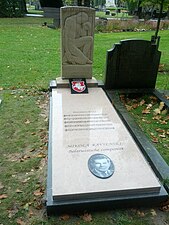| Mikola Ravienski | |
|---|---|
| Мікола Равенскі | |
| Born | 5 December 1886 Kaplantsy, Minsk Governorate, Russian Empire (now Belarus) |
| Died | 9 March 1953 Leuven, Belgium |
| Occupation(s) | composer, conductor and music critic |
| Notable work | Mahutny Boža (Almighty God) |
Mikola Jakaŭlievič Ravienski (Belarusian: Мікола Якаўлевіч Равенскі; Russian: Николай Яковлевич Равенский; 5 December 1886 – 9 March 1953) was a Belarusian composer, conductor and music critic who authored music for the famous hymn Mahutny Boža (Almighty God).
Early life
Ravienski was born on 5 December 1886 into the family of a gardener working at the Kaplancy estate in Igumensky Uyezd, Minsk Governorate of the Russian Empire (nowadays the village of Kaplancy in Byerazino District, Minsk Region, Belarus).
From the age of five he sang in a local church choir and was later invited to a church choir in Minsk where he received his primary musical education. In 1903 he was posted as a choir conductor to a Minsk monastery and then to Navahrudak where he collected over 500 folk songs.
Later life
From 1919 Ravienski worked in Minsk as a choir conductor and a school teacher. At this time his first compositions appeared - songs based on poems by Maksim Bahdanovič, Kanstancyja Bujło, an introduction to the poem "Hapon" by Vincent Dunin-Marcinkievič, the song "Oh you, Neman River" based on poetry of Źmicier Žyłunovič. In 1922 a compilation of his music was published.
In 1923 he went to Moscow to continue his musical education, where he lived for seven years, graduating from the Moscow conservatory. At the same time he was a corresponding member of the Belarusian Academy of Sciences. He wrote songs based on the poetry of Uladzimir Dubouka and Yanka Kupala and also turned to music criticism writing for Uzvyšša [be-tarask; eo] (Belarusian: Узвышша (High Ground)), a literary journal which was published between 1927 and 1931 in Soviet Belarus.
In the 1930s Ravienski taught at the Belarusian Conservatory but in 1938 was expelled from the Union of Composers because his brother Anton was executed during Stalin's Purges of 1937–38.
All of Ravienski's manuscripts and print-outs were destroyed in a fire caused by German bombing of Minsk in 1941. From 1943 he worked in a church choir and after World War 2 emigrated to Western Europe. He ultimately settled in Leuven in Belgium where he created an ensemble of Belarusian music at the local university.

He was a member of the Rada of the Belarusian Democratic Republic in exile.

Death and memory
Ravienski died on 9 March 1953 in Leuven and is buried in a local cemetery.
In November 2017, on Dziady (Grandfathers' Eve), the Belarusian community in Belgium and France installed a new tombstone on his grave. His resting place is used by the Belarusian community as a meeting place for commemorative events.
However, there is no place of his commemoration in present-day Belarus.
Works
Ravienski's works include:
- adaptations of Belarusian folk songs;
- songs based on poems by Maksim Bahdanovič ("Pahonia" and “Slutsk weavers", etc.), Yanka Kupala, Yakub Kolas ("My native corner", "Our poor land", etc.), Kanstancyja Bujło ("I love our land", "Mound"), Źmicier Žyłunovič, Źmitrok Biadulia, Uladzimir Dubouka (“Oh Belarus, my Wild Rose ”);
- opera "Branislava”;
- operetta "Zalioty"(Сourtship) (based on the vaudeville with the same by Vincent Dunin-Marcinkievič);
- music on the texts of church prayers.
In 1947 he wrote music for the poem “Prayer” by Natallia Arsiennieva which became the famous hymn Mahutny Boža (Almighty God).
He was also engaged in music research producing "Characteristic features of the Belarusian folk song".
References
- ^ "Николай Равенский: жизнеописание" [Mikola Ravienski: Autobiography]. imperiaduhu.by. Retrieved 2021-06-14.
- Christianity and the Eastern Slavs, Volume I Slavic Cultures in the Middle Ages. by Boris Gasparov (Editor), Olga Raevsky-Hughes (Editor). 1993. p. 343
- Мікола Равенскі. Жыцьцяпіс / Лявон Юрэвіч // Беларуская мэмуарыстыка на эміграцыі. Нью-Ёрк: Беларускі інстытут навукі і мастацтва , 1999. p. 193-197 (in Belarusian)
- ^ Свабода, Радыё (7 December 2007). "Імёны Свабоды: Мікола Равенскі (17.12.1886 - 3.3.1953)" [Names of Freedom: Mikola Ravienski (17.12.1886 - 3.3.1953)]. Радыё Свабода (in Belarusian). Retrieved 2021-06-14.
- Максімюк, Ян. "Мікола Равенскі" [Mikola Ravienski, by Jan Maksimiuk]. Спадчына (in Belarusian). 4–1995: 176–178.
- Наталля Гардзіенка, Лявон Юрэвіч. Рада БНР (1947—1970). Падзеі. Дакументы. Асобы. Minsk, 2013, p. 221 (In Belarusian)
- Арлоў, Уладзімер (2020). ІМЁНЫ СВАБОДЫ (Бібліятэка Свабоды. ХХІ стагодзьдзе.) (in Belarusian) (4-е выд., дап. ed.). Радыё Свабодная Эўропа / Радыё Свабода - Radio Free Europe/Radio Liberty. pp. 246-247
- "Будзьма беларусамі! " Беларусы Бельгіі паклалі новую пліту на магіле аўтара "Магутны Божа"" [Belarusians in Belgium erected a new tombstone on the grave of the author of Mahutny Boža (Almighty God)]. budzma.by (in Belarusian). Retrieved 2021-06-14.
- "На Дзяды беларусы Бельгіі і Францыі наведалі магілу Міколы Равенскага" [On Dziady Belarusians of Belgium and France visited the grave of Mikola Ravienski]. carkva-gazeta.by (in Belarusian). Retrieved 2021-06-14.